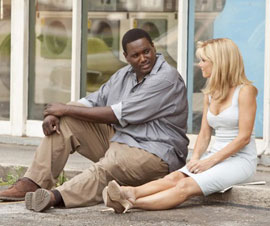 Hollywood and evangelical Christians don’t agree on much, but last night they shared a deep conviction that only God could have put an Oscar in Sandra Bullock’s hand.
Hollywood and evangelical Christians don’t agree on much, but last night they shared a deep conviction that only God could have put an Oscar in Sandra Bullock’s hand.
Often dismissed as the actress with the least star quality since the Blob, Bullock, playing a Republican, evangelical, NRA-card carrying Southern princess in “The Blind Side,” beat out Meryl Streep, Dame Helen Mirren, and Gabourey Sidibe, whose debut performance as an abused, inner-city African-American teen should have been catnip to Academy voters, who are always out to prove their solidarity with those at the far end of the social spectrum.
Some might say it was the $150 million that “The Blind Side” took in at the box office that won the Academy over. But it takes more than money to redeem an actress who earlier in the week also won the Razzie, given for the worst performance of the year. (Bullock got it for her lead role in “All About Steve.”)
Look, for instance, at “Avatar,” the new all-time money leader, which, according to influential Mars Hill pastor Mark Driscoll was the work of Satan: all it could muster was three geeky Oscars. Contrast that with Best Picture-winner “The Hurt Locker,” which took home six awards and begins with a quote from Chris Hedges, a Harvard Divinity School grad.
But before we celebrate God’s big win, it’s worth asking, whose God won?
Let’s just say that the voters who chose “The Hurt Locker” over “Avatar” aren’t in the same spiritual camp as those who ask what law would be broken if, for once, “the good guys accepted Jesus Christ into their hearts.” “Hurt Locker” fans are more likely to think that Jesus was closer, politically and morally, to the Na’vi than the war machine. (Though there’s an argument that Jesus would have advised the blue folks to “Render unto the obtainers the unobtainium.”)
One hint is the Hedges’ quote, taken from his 2002 book “War Is a Force That Gives Us Meaning,” which identifies war as a drug. During the Bush administration, Hedges himself was booed off a college campus for condemning the Iraq War.
And rallying around Bullock in “The Blind Side” isn’t really an endorsement for the values of your rank-and-file evangelical mom. Rather, her character’s support of an underprivileged African-American teen–against the better judgement of some other Christians in her circle–drew a picture for evangelicals of how Hollywood would like to see them behave.
Still, there’s hope that the studio execs will begin to cast Christians in a better light–if only because doing so sells tickets–and that positive Christian characters on the big screen, in return, will allow evangelicals, and all Americans, to trust our ideas to a common culture.
Hey, if Sandra Bullock can win an Oscar, anything could happen.

